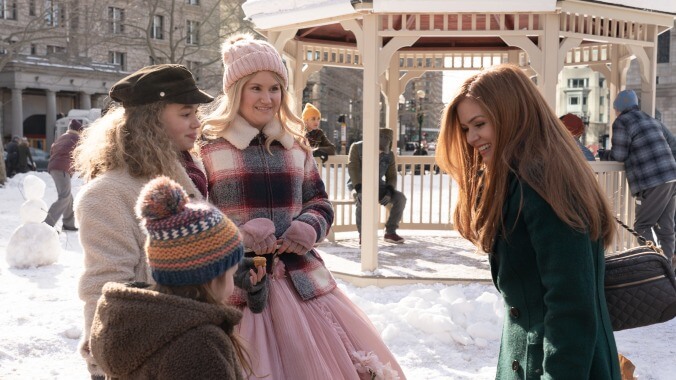Isla Fisher is a comedic firecracker who’s never quite gotten her due in Hollywood. Despite scene-stealing roles in everything from Wedding Crashers to Bachelorette to the last few seasons of Arrested Development, she might still be best known for getting regularly confused with her Nocturnal Animals co-star Amy Adams. So it’s fitting that Fisher’s new Disney+ project feels awfully similar to Enchanted, the film that made Adams a star. Like that 2007 princess vehicle, Godmothered features an optimistic fairy tale character forced to contend with the harsh realities of the real world—which, of course, supplies Disney with its umpteenth chance to subvert its regressive past. Here, though, Fisher occupies the Patrick Dempsey role of the cynical single parent who no longer believes in love or happily ever afters. In a rare straight-woman turn, the ever-likable actor pulls off the trickier-than-it-looks task of playing a character who’s perpetually annoyed without being annoying to watch.
The storybook magic comes courtesy of rising star Jillian Bell (Rough Night, Brittany Runs A Marathon), who plays naively optimistic fairy-godmother-in-training Eleanor. With fairy tale wishes no longer in vogue, the old-fashioned, bureaucratic world of “The Motherland” is in danger of shutting down. Learning, with horror, that she and the rest of the fairy godmothers will be retrained as tooth fairies, the realm’s youngest trainee takes it upon herself to sneak off to the real world and prove there’s still a place for fairy-tale dreams in the 21st century. That leads her to Mackenzie Walsh (Fisher), a local TV news producer who’s lost the spark in her life since losing her husband three years earlier. Naturally, Eleanor’s convinced that all Mackenzie needs to be happy again is to find another soulmate.
With a made-for-TV aesthetic that brings it closer to a Disney Channel Original Movie or a Hallmark Christmas rom-com than a glossy theatrical adventure, Godmothered is nowhere near as clever or inventive as Enchanted. But its breezily wholesome story will go down easily enough for family audiences, especially in this desperate-for-new-content year. After its rather garish Motherland-set prologue, Godmothered settles into a comfortable fish-out-of-water, buddy-comedy groove, and the stars provide a steady hand at the wheel for a film that’s consistently affable if not always totally cohesive. Bell, in particular, keeps Godmothered afloat with a light comedic touch that takes inspiration from Adams’ work in Enchanted but adds an even daffier undertone—including Eleanor’s Jessica Day-esque penchant for composing spontaneous, tuneless songs about her life.
Director Sharon Maguire (Bridget Jones’s Diary, Bridget Jones’s Baby) briskly moves through low-budget setpieces that include a magical home makeover, a wacky sledding mishap, and several of Eleanor’s failed attempts to conjure a ballgown for Mackenzie. While Godmothered requires a high tolerance for family-film staples like precocious kids and poorly rendered CGI animals—not to mention scenes of Oscar nominee June Squibb making puns about FaceTime—parents are at least treated to a funny runner about the sensationalizing scare tactics of local news. (Stephnie Weir regularly steals scenes as an anchor committed to selling her station’s spin-filled stories.) Tween audiences, meanwhile, get a winning avatar in Mackenzie’s oldest daughter, Jane (Jillian Shea Spaeder), a shy teen who has big dreams of being a singer but an even bigger problem with stage fright.
What elevates Godmothered is an ending that manages to tie up the film’s familiar themes in a surprisingly moving way. Like Frozen and Maleficent before it, Godmothered argues that “true love” doesn’t have to be romantic. This impressively woman-centric film ultimately hinges on Fisher delivering a lovely speech about the difficulties of protecting her daughters without limiting their dreams. The script by Kari Granlund and Melissa Stack also recontextualizes the very idea of “happily ever after,” arguing that happiness isn’t an endpoint but a state of being. Trying to live “happily” is something we should all strive for, even if our lives don’t look like fairy tales. It’s not exactly a revolutionary (or subtle) message, but it is a welcome one at the end of this hard year.

































![Rob Reiner's son booked for murder amid homicide investigation [Updated]](https://img.pastemagazine.com/wp-content/avuploads/2025/12/15131025/MixCollage-15-Dec-2025-01-10-PM-9121.jpg)








